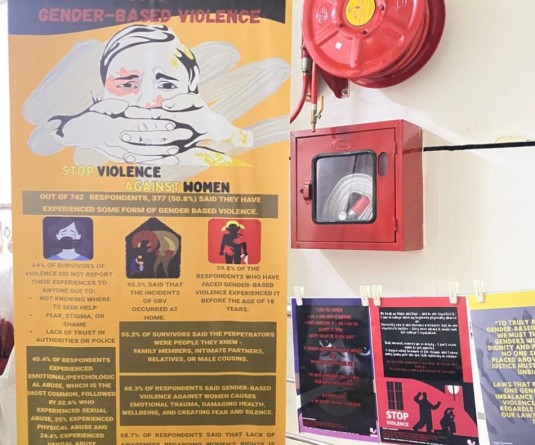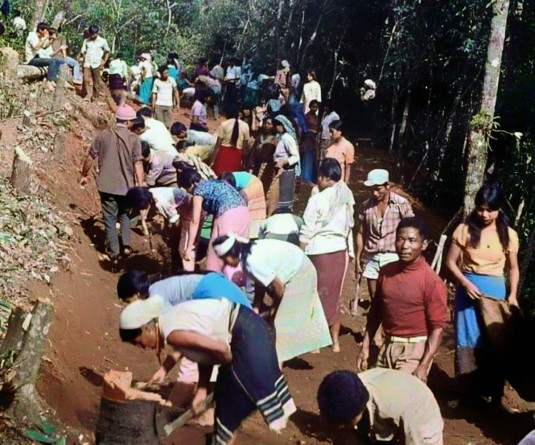
Morung Express News
Dimapur | March 8
While the environment in Nagaland today is ready for women to directly participate in policymaking, are they willing to break ground to make this difference? asked retired Chief Secretary, Banuo Z Jamir today.
“Are women truly and sincerely honest when we say that we want women legislators, lawmakers and policy makers?” she questioned, while speaking on International Women’s Day Celebration at Elim Hall, DABA, Dimapur today.
Under the theme ‘Pledge for Parity,’ the event was organised by Miqlat Ministry & Sisterhood Network in collaboration with NACWR, NSLSA & NSCW. Seven other panelists looked at the theme from other perspectives.
While men have broken into professions which were generally associated with women – like the culinary and fashion industries, Banuo noted that there is still resistance to women breaking into the one bastion still regarded as a male domain — electoral politics.
She opined that one reason could be because most women do not have access to the vast financial resources required to delve into this domain. “Are we ready to pool in our resources and support these possible representatives and can we set pass our tendency to be critical of each other and join hands to support women candidate?” she posed.
She lamented that while male candidates, regardless of behavior or acumen, receive support, women are placed under constant scrutiny and judged from day one. “Unless we support women ourselves and change our mindset, the idea of giving special reservation will only perpetuate dependency,” she argued.
Banuo, however, stressed that women are required as legislators, law makers, policy makers. There are many issues, she said, which are not understood by men. “Not because they ignore the issues intentionally - they do not understand, because they are not women.”
As an example, she recalled how the women’s toilet in a State Directorate was designed in the same way as the men’s toilet. “Everyone travelling between Kohima and Dimapur would have seen the lovely bamboo toilet for women - very well intended but definitely designed by a man.”
She further discouraged the tendency to look at history through a male point of view. Once women in history can stand alongside men, the picture looks very different, she stated, while urging that the contributions of women to Naga History be focused on.
Banuo also called for redefining the role of women, by not just empowering them but by appreciating and valuing roles which are traditionally considered to be that of women. She argued against looking at culture as a static entity. Culture she stated is what we pass on and redefined by future generations, thereby making it dynamic.
Banou further termed it “unfair to put the burden of the inequalities that we perceive today amongst men and women on the argument that men kept women under suppression and did not allow them to develop.” She deemed it necessary to also consider the impact of the same knowledge and exposure on men as well.
“Just as women are going through the transition of empowerment; men too are being forced to go through changes - almost like a disempowerment because their role of protector has been to be re-defined,” she said, while urging against generalizations.
She however lamented that empowerment is often perceived as an aggressive encroachment into the male preserve. She urged women to show through “our conduct and achievements” that empowerment of women would mean equal partnership towards a stronger and more vibrant society.
NBCC Women Secretary, Visasieu Dolie meanwhile argued: “If we are equal in the eyes of God, why not in the eyes of man?” She further questioned whether the role of women in reailty is given equal status and dignity.
However, she also put forth the biblical view that men and women are “created distinct from each other.” “Any philosophy that denies or overlooks differences of a man and woman is blurring the parity debate in true sense,” she stated.
While Mayang Lima, District and Session Judge, Chairman MDLSA, Mon highlighted the legal avenues available for women; Edward N Bass, a teacher cautioned against discrimination becoming a norm.
“Parity in society starts with yourself, family and society”, he said. Shikuto Zalipu, General Secretary, GB Federation Nagaland claimed there are clear classifications regarding the role of women and men since time immemorial, and said any change should be discussed holistically at the grassroots level.
Hukheli Wotsa, President Women Hoho Dimapur said that without creating the necessary platform through legislative mechanism, change cannot be brought. She further stressed on the role of women as peace-builders over the ages.
Dr Sanjoy Barbora Associate Professor Tata Institutue of Social Sciences, Guwahati said: “We live in an unequal society or home reinforced through our institution we hold sacred or through tradition.” He encouraged confronting these issues through solidarity and changes in perception.
Dr. Asangba Tzüdir, Editor of Heritage Publishing House meanwhile called for interrogating and dismantling the male centric discourses, legitimated by oral traditions that have institutionalized patriarchy. Oral traditions and Naga worldviews need to be countered starting from the family, he said. Naga women, he argued should create their own spaces beyond the bounds of patriarchy, providing a new outlook and identity to the ‘new Naga woman’.






